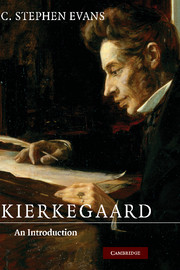Book contents
- Frontmatter
- Contents
- Preface
- Chronology
- Sigla used for Kierkegaard's published writings
- 1 Introduction: Kierkegaard's life and works
- 2 Pseudonymity and indirect communication
- 3 The human self: Truth and subjectivity
- 4 The stages of existence: Forms of the aesthetic life
- 5 The ethical life as the quest for selfhood
- 6 Religious existence: Religiousness A
- 7 Christian existence: Faith and the paradox
- 8 Kierkegaard's dual challenge to the contemporary world
- For further reading: some personal suggestions
- Index
8 - Kierkegaard's dual challenge to the contemporary world
Published online by Cambridge University Press: 05 June 2012
- Frontmatter
- Contents
- Preface
- Chronology
- Sigla used for Kierkegaard's published writings
- 1 Introduction: Kierkegaard's life and works
- 2 Pseudonymity and indirect communication
- 3 The human self: Truth and subjectivity
- 4 The stages of existence: Forms of the aesthetic life
- 5 The ethical life as the quest for selfhood
- 6 Religious existence: Religiousness A
- 7 Christian existence: Faith and the paradox
- 8 Kierkegaard's dual challenge to the contemporary world
- For further reading: some personal suggestions
- Index
Summary
As a Christian philosopher, Kierkegaard presents a dual challenge to the contemporary world. On the one hand, he forcefully presents a picture of Christian existence as offering the highest possibilities for fulfillment for human beings. Such a view of human life is clearly a challenge in the contemporary pluralistic world, both to advocates of a secular worldview as well as advocates of other religious faiths. However, Kierkegaard's critique of “Christendom” presents a powerful challenge to the contemporary Christian Church as well, particularly when it attempts to identify itself with a particular culture, and even more when the Church itself becomes part of what Kierkegaard calls “the established order.” In this concluding chapter, I shall try to give an account of Kierkegaard's understanding of Christian existence that does justice to both of these challenges.
DESPAIR AND THE QUEST FOR EXISTENTIAL UNITY
One of Kierkegaard's most influential books is The Sickness Unto Death. Although the book is pseudonymous, ascribed to “Anti-Climacus,” it comes from the later period of Kierkegaard's authorship, when Kierkegaard's works have a strongly Christian character, and differs markedly from the earlier pseudonymous writings that Kierkegaard labels “aesthetic.” Kierkegaard wrote Sickness Unto Death with the intention of publishing the book under his own name, but struggled over whether he should do so, since he felt that the Christian ideals the book embodies were ones that he personally fell far short of.
- Type
- Chapter
- Information
- KierkegaardAn Introduction, pp. 167 - 195Publisher: Cambridge University PressPrint publication year: 2009



